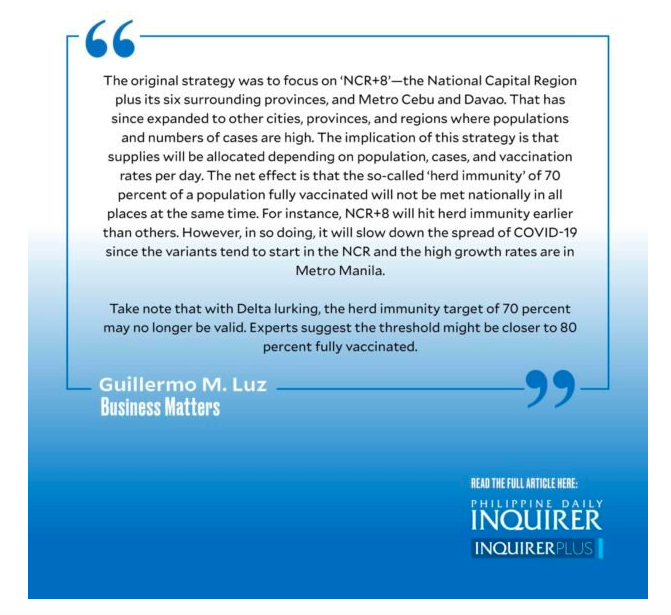Vaccine access for all

As we have experienced throughout this pandemic period, it’s been a constant rollercoaster ride of ups and downs. Just when we thought we were hitting our stride with vaccinations across the country, the Delta variant started to spread and push our case numbers up.
Looking back to trends since the pandemic started in March 2020, we see three clear peaks, each coinciding with a variant. The first peak was in August/September 2020 (Wuhan variant); the second was in April/May (UK variant); the third one is now (Delta variant).
As of Aug. 18, we have over 105,000 active cases, with 30,000 of those in Metro Manila. Over the last week, we’ve averaged roughly 13,000 new cases per day nationwide, of which about 3,500 were in the National Capital Region. Note that the two-week growth rates for new cases are significantly higher in Metro Manila than for the rest of the country. Worst of all, the positivity rate (as a percentage of those tested) is running around 25 percent.
Remember these numbers, because they are key to appreciating the vaccination rollout strategy. Experts tell us that all variants entered the country first through Metro Manila before local transmission in the rest of the country.
The good news is that vaccinations are proceeding at a pace of around 410,000 jabs per day for the last week. About 13 million people, or 12 percent of the entire population, has been fully vaccinated. The goal is to raise this daily rate to between 550,000 and 750,000 vaccinations per day as supplies increase.
Metro Manila vaccinated 165,000 a day over the past week, and now has 30 percent of its population fully vaccinated. The goal is to push the daily vaccination rate back over 200,000 as new supplies arrive.
This good news was made possible by the larger deliveries of vaccines over the last several months. In February and March, we averaged only 1.25 million doses of vaccines delivered per month. This has steadily climbed to an expected 20 to 25 million for August, and hopefully a steady 20 million per month through to the end of the year.
The original strategy was to focus on “NCR+8”—the National Capital Region plus its six surrounding provinces, and Metro Cebu and Davao. That has since expanded to other cities, provinces, and regions where populations and numbers of cases are high. The implication of this strategy is that supplies will be allocated depending on population, cases, and vaccination rates per day. The net effect is that the so-called “herd immunity” of 70 percent of a population fully vaccinated will not be met nationally in all places at the same time. For instance, NCR+8 will hit herd immunity earlier than others. However, in so doing, it will slow down the spread of COVID-19 since the variants tend to start in the NCR and the high growth rates are in Metro Manila.
Take note that with Delta lurking, the herd immunity target of 70 percent may no longer be valid. Experts suggest the threshold might be closer to 80 percent fully vaccinated.
Vaccinations are necessary—but not sufficient—to stem this tide. Even lockdowns seem to have limited impact; new cases seemed to rise even under a lockdown (probably because their onset preceded it). In many countries with high vaccination coverage, they’ve had to return to testing, contact tracing, mask usage, social distancing, and other minimum health standards to get the pandemic under control. We need to keep that in mind even as we push for more vaccinations.
In the meantime, all our efforts have to focus on pushing our vaccination rates higher into the 750,000 a day rate and our coverage to at least 50 percent of the population fully vaccinated, before we begin establishing access rules for the vaccinated versus the unvaccinated. Vaccine access for all has to be top of mind for now. We should open up vaccinations to all sectors and the general public instead of sticking to the old segmented approach. The race against Delta is very much on.
——————
Guillermo M. Luz is chief resilience officer of the Philippine Disaster Resilience Foundation (www.pdrf.org)
——————
Business Matters is a project of the Makati Business Club (makatibusinessclub@mbc.com.ph).
For more news about the novel coronavirus click here.
What you need to know about Coronavirus.
For more information on COVID-19, call the DOH Hotline: (02) 86517800 local 1149/1150.
The Inquirer Foundation supports our healthcare frontliners and is still accepting cash donations to be deposited at Banco de Oro (BDO) current account #007960018860 or donate through PayMaya using this link .
Disclaimer: The comments uploaded on this site do not necessarily represent or reflect the views of management and owner of Cebudailynews. We reserve the right to exclude comments that we deem to be inconsistent with our editorial standards.
